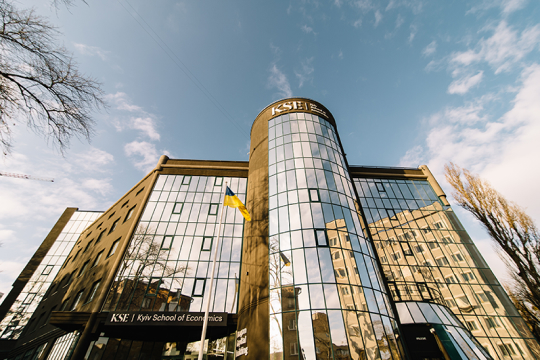Yermak-McFaul Group
About Group
The Yermak-McFaul International Working Group on Russian Sanctions is an international working Group of independent experts on sanctions against Russia.
The purpose of the Group is to provide a comprehensive list of possible additional economic and political measures to strengthen US, European and global sanctions against Russia and Belarus in order to end Russia’s war against Ukraine as soon as possible.
The Group was created at the initiative of the President of Ukraine. The Group is co-chaired by the head of the Office of the President of Ukraine, Andriy Yermak, and the former US ambassador to Russia, Stanford University professor Michael McFaul.
Group Members
More than 100 experts operate in the working Group, most of whom represent the USA and Ukraine. Analytical materials for the Group are provided by KSE Institute, Institute for International Finance, Yale School of Management, as well as the Economists for Ukraine association.
The working group includes independent international experts, such as:
- Michael Anthony McFaul, an American academic and diplomat, Director at the Freeman Spogli Institute for International Studies, the Ken Olivier and Angela Nomellini Professor of International Studies in the Department of Political Science, and the Peter and Helen Bing Senior Fellow at the Hoover Institution.
- Anders Åslund, a Swedish economist and diplomat, leading international expert on national economies of Ukraine, Russia and the countries of the former USSR;
- William Taylor, former US ambassador to Ukraine;
- Larry Diamond, American political sociologist;
- Francis Fukuyama, American philosopher, political economist and publicist ;
- Christopher Miller, an American retired United States Army Special Forces colonel who served as acting United States secretary of defense from November 9, 2020, to January 20, 2021, and others.
Kyiv School of Economics is presented by:
- Tymofiy Mylovanov, KSE President, Associate Professor of the University of Pittsburgh, Minister of Economic Development, Trade and Agriculture of Ukraine (2019-2020);
- Natalija Shapoval, Head of KSE Institute, Vice President for Economic and Policy Research at KSE;
- Tymofii Brik, Rector at the KSE University, Head of Sociological Research at KSE, Vice President for International Relations.
KSE Graduates also took part in the development of the sanctions package: Yurii Gorodnichenko, a member of the KSE International Academic Board, professor at University of California, Berkeley, and Ilona Sologoub, Director of Political and Economic Research at Kyiv School of Economics, Scientific Editor at VoxUkraine.
The Group also includes two secretaries: Vladyslav Vlasyuk from the Ukrainian side and Bronte Cass from the US side.
Progress in the implementation of the Action plan on strengthening sanctions against the RF:
On behalf of the Government and the Office of the President of Ukraine, the KSE Institute also monitors the implementation of sanctions, analyzes their effectiveness, and prepares other analytical documents regarding the need to introduce new restrictions against the Russian economy.
Currently, the progress of the implementation of the Plan is 70%. Meaning more than half of the plan’s measures have been partially or fully implemented.
Group’s products:
The Sanctions Group is developing a list of documents, strategies and roadmaps that contain plans and recommendations for the implementation of sanctions against Russia and Belarus, as well as monitoring their effectiveness.
Papers and Statements
- Paper #1. Action plan on strengthening sanctions against the Russian Federation, April 2022 PDF
- Paper #2. Roadmap of energy sanctions, May 2022 PDF
- Paper #3. Roadmap of individual sanctions, June 2022 PDF
- Paper #4. Roadmap of financial sanctions, June 2022 PDF
- Paper #5. The Case for Designating the Russian Federation as a State Sponsor of Terrorism, September 2022 PDF
- Paper #6. Why and How to Confiscate Russia’s Sovereign Assets to Help Rebuild Ukraine, October 2022 PDF
- Paper #7. IT & Supporting Technologies: Recommendations for Sanctions against the Russian Federation, November 2022 PDF
- Paper #8. Rosatom and Civilian Nuclear Power: Recommendations for Sanctions against the Russian Federation, November 2022 PDF
- Paper #9. Measures to Increase The Effectiveness of Sanctions, November 2022 PDF
- Paper #10. Implementation of the Oil Price Cap, November 2022 PDF
- Paper #11. Action Plan 2.0 on Strengthening Sanctions Against the Russian Federation, April 2023 PDF
- Paper #12. Strengthening Sanctions to Stop Western Technology from Helping Russia’s Military Industrial Complex, July 2023 PDF
- Paper #13. Strengthening Sanctions on Foreign Components in Russian Military Drones, August 2023 PDF
- Paper #14. Using Energy Sanctions to Shorten the War, September 2023 PDF
- Paper #15. Why and How the West Should Seize Russia’s Sovereign Assets to Help Rebuild Ukraine, September 2023 PDF
- Paper #16. Challenges of Export Controls Enforcement, January 2024 PDF
- Paper #17. Exposing and Exploiting the Kremlin’s Software Networks and Dependencies, January 2024 PDF
- Paper #18. Energy Sanctions: Four Key Steps to Constrain Russia in 2024 and Beyond, February 2024 PDF
- Paper #19. Action Plan 3.0 - Strengthening Sanctions Against the Russian Federation, May 2024 PDF
- Paper #20. Export Controls: A Key G-7 Tool to Halt Russia’s War, June 2024 PDF
- Statement Before the G7 meeting, June 2022 PDF
- Statement on the 6th sanctions package, June 2022 PDF
- Statement on European Energy Security and Siemens Turbines, July 2022 PDF
- Statement on Why Russia Should Be Excluded from the Financial Task Force on Money Laundering (FATF), October 2022 PDF
- Statement on a Price Cap on Russian Oil Products, February 2023 PDF
Assessment of Impact
More about the Group’s activities – here.
Contacts


